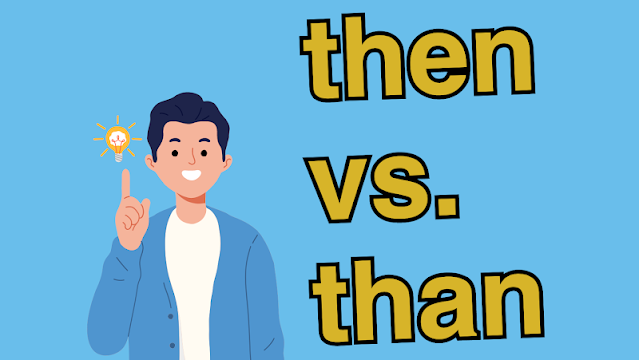經常被混淆的詞彙 #2:「then」vs.「than」
本系列 ,我會專門探討一些經常被混淆的詞彙。
這些詞彙,有些因為涉及英文跟廣東話某些音素(phoneme)分別而令廣東話人士自然覺得困難,有些則因為在書寫時串法相近,當中可能只有一兩個字母的不同,所以特別容易被混淆。
這次,我想討論一下「then」和「than」,這兩個有著不同意思和文法角色的英文字。
「Then」(發音為 /ðɛn/,包含母音 /ɛ/,像「set」中一樣,書寫時以「e」字母代表),是一個副詞,意思是「那時候」或「在某事件後」。
例如:
I saw her. Then, I saw him. (我看見了她。然後,我看見了他。)
I was living in Singapore then. (那時我住在新加坡。)
He will be gone then. (那時他將已離開了。)
「Than」(發音為 /ðæn/,包含母音 /æ/,跟「cat」字中的一樣,書寫時用「a」字母代表),則是英文中的一個文法助詞,用於比較不同的單字、詞組或子句。
例如:
This cup is bigger than that cup. (這個杯子比那個杯子大。)
She can do it better than he. (她能做得比他更好。)
我在其他篇章中解釋過(例如 這篇),廣東話人士自然會覺得難以分辨英文母音音素中的/ɛ/ 和/æ/,因為廣東話只有/ɛ/(雖然只有加長的版本,如「些」中),而沒有/æ/。
不過,今次,這並非大家容易混淆「then」和「than」的主因。
事實上,即使能清楚分辨/ɛ/ 和/æ/的母語人士,也經常會在書寫時把這兩個字混淆。
原因是,作為文法助詞的「than」,在發音時,在句中屬於非重音音節,即母音 /æ/的部分不會被完全發音。
當「than」是非重音,/æ/又不被完整發出時,它聽起來便與「then」非常相似了。
因為「then」和「than」在發音如此接近,導致母語人士在書寫時也經常出錯,例如:
She can do it better then he.* ❌
假如你能意識到這點,下次有機會使用它們時便能格外留意了。
「Then」是個時間副詞,而「than」是在作比較的情況下使用的文法助詞。
** 請注意以上第二個「than」的例子:
在這包含「than」的例句中,「than」連接了兩個完整的子句:
She can do it better than he can do it.
但我們經常省略了後面重複的部份,只寫:
She can do it better than he. (or ...than he can.)
這就是為何我們會在「than」後使月用「he」的字形。
我在另外的newsletter和社交媒體帖子中也說過,現代英文中,只有代名詞才還有主語/賓語字形之分,其他名詞一律已沒有。 所以,就連主語/賓語代名詞字形的分別(像「he」和「him」)亦已漸漸變得不重要。當句子結構不完全簡單直接時,如這例句,這些代名詞字形經常會被互換使用。
因此在現今的用法上,「she can do it better than him」非但完全可以接受,甚至用起來可能還更自然。
小練習
以下句子應該要用「then」還「than」?
- a)The challenges of tomorrow will require more innovative solutions ______________ (then / than) the problems of today.
- b) After completing her degree, she plans to gain some work experience, and ________________ (then / than) she will consider pursuing further education.
_____________
(English version)
This is an ongoing series in which I explain pairs of words that are often mixed up -- because they have phonemic differences (音素分別) that are naturally difficult for Cantonese speakers, or because they are similar in spelling, often with only one or two letters that are different.
This time, I want to focus on the words “then” and “than.” These are two different words that have different grammatical roles and meanings in English.
“Then” (pronounced /ðɛn/, with the vowel /ɛ/, like in “set,” and spelled with an “e”), is an adverb that means “at that time” or “after something.”
For example:
I saw her. Then, I saw him. (我看見了她。然後,我看見了他。)
I was living in Singapore then. 那時我住在新加坡。
He will be gone then. (那時他將已離開了。)
“Than” (pronounced /ðæn/, with the vowel /æ/, like in “cat,” and spelled with an “a”), is a particle that is used to introduce comparisons between words, phrases, or clauses in English.
For example:
This cup is bigger than that cup. (這個杯子比那個杯子大。)
She can do it better than he. (她能做得比他更好。)
As I have explained in other entries (like this one), Cantonese speakers naturally find it difficult to differentiate between the English vowel phonemes /ɛ/ and /æ/ because Cantonese has /ɛ/ (although only the lengthened version, like in “些”) but no /æ/.
However, this time, this is not the main reason why you would mix up these words.
In fact, these two words are often mixed up in writing by native speakers as well, even though they can clearly differentiate between /ɛ/ and /æ/ -- the reason being that the word “than,” as a grammatical particle, is usually unstressed within a sentence, which means that its vowel /æ/ is not fully realized (不會被充分發音).
When “than” is unstressed in pronunciation, and the /æ/ is not fully realized, the word sounds very similar to “then.”
Because “then” and “than” are often pronounced very similarly or in the same way, native speakers also often mix up their written versions. For example:
She can do it better then he.* ❌
So, if you know this consciously, you can watch out for these two words when you need to use one (or both) of them next.
“Then” is a time adverb, and “than” is a grammatical particle used in comparisons.
Note about the second example with “than”*:
In the second example sentence with “than,” “than” is connecting two complete clauses:
She can do it better than he can do it.
But we usually omit the parts that are repeated, leaving:
She can do it better than he. (or ...than he can.)
That is why we have the form “he” after “than” here.
However, as I have explained in other newsletters and social media content, subject/object noun forms in English only exist in pronouns now. As such, these differentiated pronoun forms (like “he” vs. “him”) are becoming less important and are often interchangeable when they are not in simple, structurally straightforward clauses.
Because of this, “she can do it better than him” is also completely acceptable in current usage and might, in fact, sound more natural.
Mini Exercise
Should it be “then” or “than” in the following sentences?
- a) The challenges of tomorrow will require more innovative solutions ______________ (then / than) the problems of today.
- b) After completing her degree, she plans to gain some work experience, and ________________ (then / than) she will consider pursuing further education.







Comments
Post a Comment